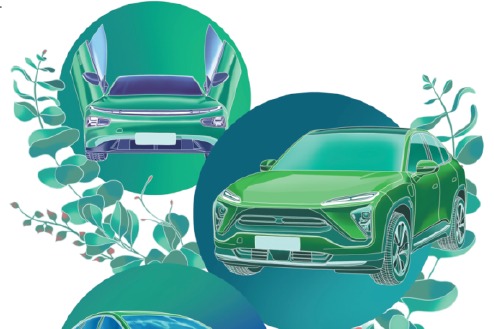US, EU can ride the tide of China's EV success


The rise of Chinese-made electric vehicles in the global market has drawn both admiration and criticism. On the one hand, China's initiatives in the EV and renewable energy sectors have been widely acknowledged by international institutions such as the United Nations. China's leadership in promoting sustainable development through EVs has contributed significantly to international efforts to address climate change. On the other hand, some Western media outlets downplay or selectively report on these achievements. Some even attribute China's success in the sector to "unfair practices". These claims fail to capture the multifaceted reality behind China's achievements.
Chinese-made EVs are competitive because of three primary factors: relentless innovation, a robust manufacturing ecosystem, and an intensely competitive domestic market. At a time when climate change and geopolitical tensions are creating divisions in the international community, the Chinese EV industry presents a unique opportunity for global collaboration and progress in combating climate change.
Innovation, collaboration, competition
China's remarkable progress in the EV sector owes much to its continued focus on innovation. Recognizing the transformative potential of EV technology, China has invested heavily in research since the early 1990s and encouraged collaboration between universities, research institutes, and industries. This synergy helped EV technologies to be developed in laboratories and applied to industry, creating a thriving market for clean energy vehicles.
Yet this innovation model is not unique to China. Countries such as the United States and Germany have long used similar strategies to accelerate their industrial and technological advancement. Global cooperation, too, has played a pivotal role in promoting innovation in the EV sector. Cross-border academic collaboration and joint research efforts have helped achieve breakthroughs faster than usual, showing that the success of the EV industry is the result of a global innovation system rather than the efforts of a single country.
Over the past four decades, China has transformed into a global manufacturing hub. Its comprehensive and efficient industrial value chain has been instrumental in the rapid growth of the EV industry. From raw materials to advanced components, China's manufacturing ecosystem supports high-quality, cost-effective production. This well-integrated system allows Chinese EV manufacturers to develop products quickly while adhering to stringent international quality standards.
The vast and fiercely competitive domestic market of China has been another driving force behind the success of its EV industry. Companies are pushed to improve quality, introduce advanced features, and reduce costs to attract increasingly discerning consumers. This dynamic environment has not only raised the bar for Chinese EV manufacturers but also prepared them to compete with their foreign counterparts in the international market.
While EVs are widely seen as low-carbon modes of transportation, mitigating climate change, some Western economies have introduced trade restrictions to limit China's EV industry. Tariffs and other barriers created by these economies against Chinese-made EVs disrupt the normal functioning of the global market, increase consumer costs, and delay the transition to green energy. These policies undermine the climate commitments of these countries.
The inconsistency is particularly stark in the European Union, whose member states have long championed climate action. Restricting the access of Chinese-made EVs to traditional automobile markets risks slowing the global shift to green and sustainable transportation. Instead of fostering innovation and competition, such measures increase costs for consumers and harm the environment.
Cooperate more with partners abroad
To respond to trade restrictions imposed by the US and EU, Chinese EV manufacturers can form joint ventures, and establish production facilities abroad. By doing so, Chinese companies can not only address employment concerns in host countries but also enhance their competitiveness in foreign markets. Japanese automakers employed a similar strategy in the 1980s.
Additionally, Chinese companies must rethink their market strategies by offering localized solutions and establishing partnerships with foreign counterparts. For example, Chinese companies can conduct cooperative R&D with their EU and US counterparts, to help them to accelerate the transition from traditional vehicles to EVs. These measures can help maintain a global presence despite protectionist policies. By emphasizing product and technology innovation, Chinese EV-makers can further strengthen their global standing.
Governments in China and Western countries can work together to reduce trade barriers and streamline approval processes for each other's traditional and electric vehicle industries.
There are also opportunities to collaborate on setting international EV standards for charging infrastructure, battery technology, and safety to ensure interoperability. Transparent mechanisms can also be established for dispute resolution and technology sharing to build trust.
By prioritizing these approaches, China and Western countries can foster a cooperative, innovative, and sustainable EV ecosystem that benefits all stakeholders and accelerates the global transition to clean transportation.
Amid geopolitical tensions, the uncertain economic future, and the looming climate disasters, global collaboration is the only way to address these challenges and move to a sustainable future. As the leader in EV technology and manufacturing, China offers Western automakers valuable opportunities to make the transition to EVs. Open markets and cooperative frameworks can promote innovation, reduce costs, and help achieve global climate goals. By facilitating joint efforts in areas such as EVs and renewable energy technologies, countries can leverage shared interests to make meaningful progress on climate action.
Xue Lan is a professor and dean of Schwarzman College, Tsinghua University. The views don't necessarily represent those of China Daily.
If you have a specific expertise, or would like to share your thought about our stories, then send us your writings at opinion@chinadaily.com.cn, and comment@chinadaily.com.cn.


































